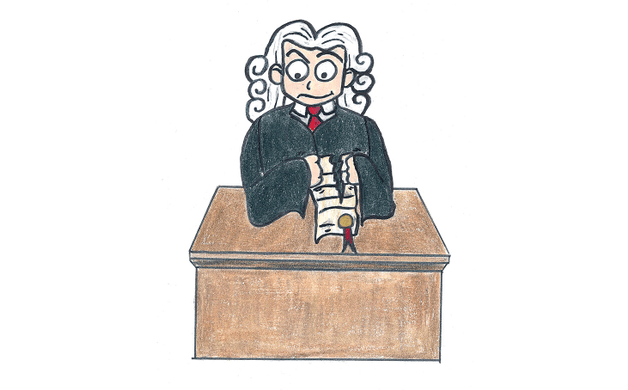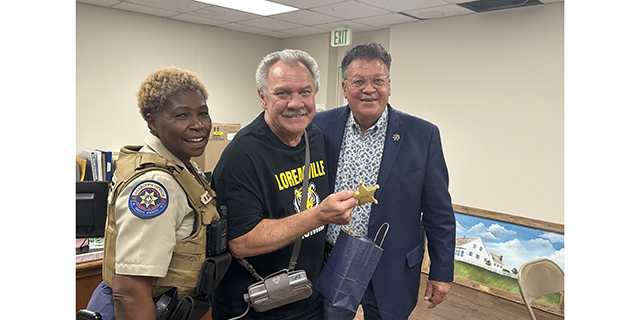Weddings With A Hitch
Published 7:00 am Friday, August 10, 2018

- Weddings With A Hitch
Stories From Justices Of The Peace
By Patrice Doucet / Illustrated by Carson Hebert
Financially speaking, low-key weddings make a lot of sense. For decades, couples have been drawn to having civil weddings because of their casualness, individuality and simplicity. Vows are repeated, rings are exchanged, the justice of the peace or judge pronounces the couple married; they kiss; photos are snapped. The whole ceremony can last as little as 10 minutes. Simple – yet not always. Stories from these wedding officiants show, some of the best-laid plans can veer “off the aisle.”
Couples have been married outdoors, in bars, boats, at camps, hospitals, in chapels, judge’s chambers, night clubs…one prison inmate called at 2am requesting to be married, but was declined. As you’ll see, justices of the peace do whatever they can to make the wedding day reflect unique love and personalities
Giddy up…Woah!
Johnny Hebert has served as a justice of the peace in Iberia Parish for 41 years, and in early July marked an impressive 3,301 marriages. In that time, he’s married generations of families – in one family alone, he’s officiated over 27 civil weddings. He’s driven through 10 inches of rain to perform a wedding and conducted seven in one day with a broken foot.
Hebert has a lifetime of memories and shares a few of his favorites:
Over 30 years ago, he was asked to perform a ceremony on horseback at a remote ranch between Cade and St. Martinville. Everyone, including Hebert was instructed to wear western attire. When he arrived, the bride and her father rode up on horses; he quickly noticed men holding muskets. The plan was that the father would dismount just before the vows and Hebert would take his horse. But, when Hebert mounted the horse, it started bucking fiercely. “I was holding my hat, the marriage license and vows in one hand and the saddle starts sliding to one side,” laughs Hebert still. “I was trying to shift the saddle back upright to avoid falling. When I finally got settled, I was under an oak tree with the bride and groom and there’s a rope hanging overhead with a noose swaying in the wind and knocking me on the head.”
Cold Feet- Warm Heart?
Hebert recalls many nervous grooms. One in his 70s driving up to meet the bride at Hebert’s home and, without stopping, slowly driving off again. “I ran down the road waiving him down and eventually talked him into coming back to the house where I married them.” On another occasion, one groom fainted twice during the ceremony. “The only reason he didn’t faint a third time is because I sped up my part,” snickers Hebert.
Justices of the peace are patient. When a groom-to-be was kidnapped by his groomsmen and brought to a bar in Delcambre, Hebert, his wife and the bride-to-be waited hours at Hebert’s home until the groom was returned at midnight for the ceremony. “And that’s why we don’t do weddings at our house anymore,” smiles Hebert’s wife Nancy.
Shotgun Wedding, Real McCoy
Another Iberia Parish Justice of the Peace, Henry Charpentier, has been performing civil weddings for 22 years. And, in that time, two weddings stand out in his mind.
About 10 years ago, just before an outdoor ceremony near New Iberia, the father of the bride alerted Charpentier that at the part of the ceremony asking “who gives this woman in marriage” he would come out of the house with a shotgun. “I thought it was going to be a joke and uneventful,” says Charpentier. “The ceremony gets underway and when we get to that point where I ask ‘the’ question, sure enough, the bride’s father comes out of the house, along with a few other relatives, holding shotguns and…commenced shooting them up in the air! They were having a good ole time. The bride and groom were in shock. I didn’t stay around long after that.”
Marriage is a (Short) Journey
No doubt, Justices of the Peace have to “think on their feet.” Years ago, when getting a call from a couple in Delcambre asking that he marry them, Charpentier was aware that Delcambre falls within Vermilion and Iberia Parishes, and first had to confirm that they lived within his jurisdiction, Iberia Parish. They said yes. “I drove out there early that Sunday evening looking for the house and stopped to ask a cable TV repairman for directions. When he looked up the address, it turned out that the residence was in Vermilion Parish, not Iberia. “Arriving at the home, Charpentier sees a party already in progress, with plenty of people, a barbeque – the whole shebang. “I spoke to the couple in private and told them that the wedding couldn’t take place at the home because it was outside of my jurisdiction.” After a short discussion, the couple turned to their guests and announced the problem, telling the group to ‘stay put’ and that they were going to get married down the road and be right back. The bride and groom-to-be and two witnesses jumped in their car, with Charpentier following, and drove just inside the Iberia Parish line where Charpentier married them on the side of the road.
I Do…I Don’t
Judge Gerard Wattigny retired after 18 years from the 16th Judicial District with a few memorable weddings of his own. Two of them were when he married each of his daughters in his home, with family and friends attending.
Another wedding was equally as memorable for a different reason. He recalls one couple in their mid-20’s arriving at his office on a Friday, with license in hand, wanting to get married. “I remember they displayed a lot of affection, kissing and holding each other. After the ceremony, I wished them a nice honeymoon. The next Monday, I heard a knock at my office door; it was the groom from the Friday wedding asking me to tear up the papers. ‘We made a big mistake,’ he said.” Wattigny explained that, by Louisiana law, a judge or justice of the peace is obligated to send the marriage license to the Clerk of Courts office within 10 days of the marriage.
For all they go through, civil wedding officiants will tell you that they take their duties very seriously. Hebert says he considers himself a public servant who is standing next to God. “When you do what I do, you have this innate feeling if a couple is going to make a marriage work,” he says. “I explain to couples that this is a lot more than putting a ring on and signing the most important document that you’ll ever sign. It’s communication; it’s commitment. I advise couples not make a hasty decision.“
Wattigny agrees that couples need to “get to know one another well before marrying.”
Charpentier advices, “It’s a lifelong journey, be accepting and truly be tolerant and flexible. And, most importantly, enjoy life; it shouldn’t be a job.”





